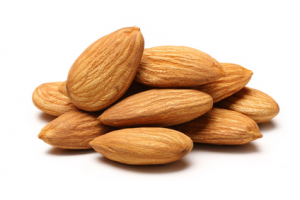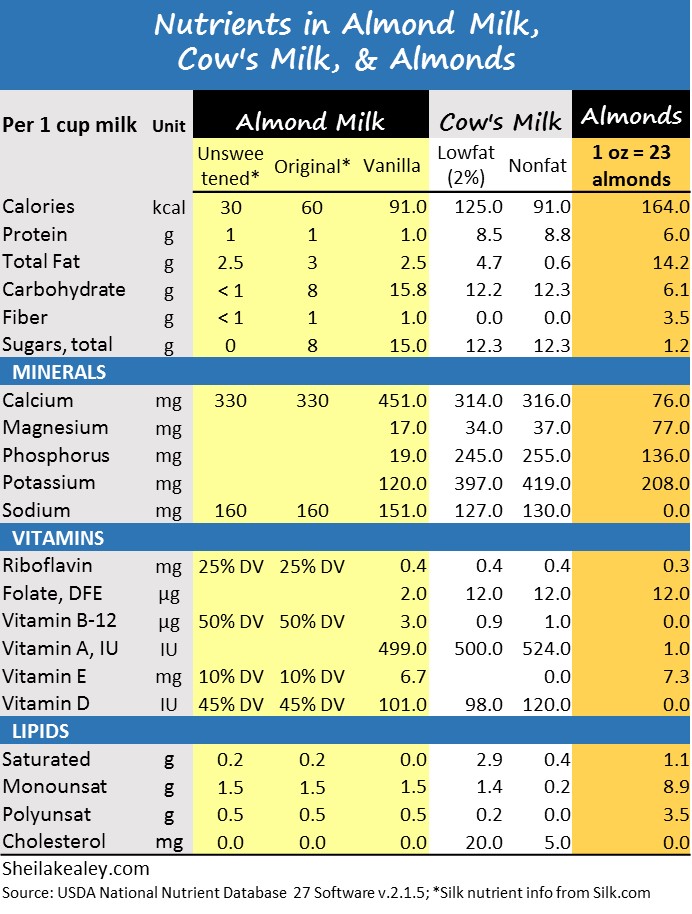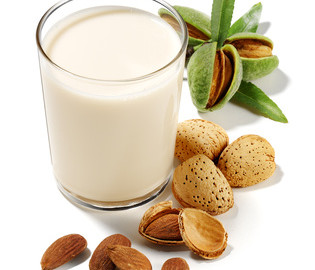Plant-based milks are becoming more popular. Almond milk is leading the way, and currently dominates the plant-based milk market. Is it as healthy as it sounds?
What is Almond Milk?
Almond milk is made by soaking almonds in water until soft, blending with water to a milk-like consistency, and removing solid particles. It is popular with those looking for a substitute for dairy (vegans, paleo crowd), those who are lactose intolerant, and many others looking for alternatives to dairy. Usually you can find almond milk in plain, vanilla, or chocolate flavors.
The Claims
Most of the health claims for almond milk relate to the low calorie content, low saturated fat content, the benefits of almonds, or the added vitamins and minerals. If you delve deeper into the internet (not recommended!), you’ll find claims from preventing Alzheimer’s (because it has Vitamin D), to improving vision, or increasing muscle growth and healing.
 Almond Health Benefits. A growing body of research suggests that almond consumption promotes good health. Almonds are a great source of healthy monounsaturated and polyunsaturated fats, fiber, vitamin E and important minerals (notably magnesium). Among other benefits, almond consumption has been linked to lower LDL (“bad” cholesterol), increased HDL (“good” cholesterol), lower blood pressure and improved blood sugar control.
Almond Health Benefits. A growing body of research suggests that almond consumption promotes good health. Almonds are a great source of healthy monounsaturated and polyunsaturated fats, fiber, vitamin E and important minerals (notably magnesium). Among other benefits, almond consumption has been linked to lower LDL (“bad” cholesterol), increased HDL (“good” cholesterol), lower blood pressure and improved blood sugar control.
Beyond nutrition, many believe almond milk to be more “natural” and “eco-friendly” than cow’s milk.
The Evidence
First, a look at the nutrients in almond milk.
Protein. Comparing the protein content of almonds to almond milk is telling: 1 oz of almonds (about 23 almonds) has 6 grams of protein, while 1 cup of almond milk has only 1 gram of protein. That means that 1 cup of almond milk has the equivalent of about 4 almonds, and is mostly filtered water. This is something to consider if you’re drinking almond milk for protein, or to reap the health benefits of almonds! (for comparison, dairy and soy milk have about 8 g protein/cup). Some brands have started to add extra protein (for example, this Silk version has 5 g protein, from pea protein, and added fiber from corn dextrin).
Calories. Almond milk is lower in calories than most other milks (not surprising – it is mostly water and a few almonds). Sweetened varieties are higher in sugar and calories.
Vitamins & Minerals. Unfortified almond milk does not contain a significant amount of vitamins or minerals. Fortified brands add vitamins and minerals (usually vitamins A, D, B2, B12, Calcium, and Zinc), and the amounts will vary by brand.
Fats. Almond milk is relatively low total fat, low in saturated fat, and contains no cholesterol.
This table compares the nutrients in 1 cup of almond milk (unsweetened, original, vanilla) cow’s milk (lowfat, nonfat), and 1 ounce of almonds (about 23 almonds, or 1/4 cup slivered).
 Is Almond Milk Eco-Friendly?
Is Almond Milk Eco-Friendly?
Buying a beverage containing mainly filtered water isn’t ecologically friendly. Also, growing almonds is water intensive, and concerns are mounting about the environmental impact of almond consumption. It’s not simple to compare the environmental impact of various milks, but this article provides good food for thought.
Bottom Line
The term “almond milk” is misleading in terms of nutrition, because it doesn’t contain large amounts of the nutrients in almonds or milk (and technically “milk” should come from a mammary gland). Many of the claims for almond milk relate to the health benefits of consuming almonds: given the meager amount of almonds in almond milk, these health benefits are doubtful. The beneficial nutrients that some almond milks boast on their labels (e.g., high in vitamin E, rich in calcium) are vitamins and minerals added during processing.
Almond milk is low in saturated fat and cholesterol, which might be better for health than most varieties of cow’s milk (except nonfat), although it’s possible that dairy fat is not as harmful as once thought for certain conditions, but more research is needed to figure out the influence of dairy fats on health.
The low calorie content of almond milk might benefit those who are limiting their calorie intake. But while lower in calories, keep in mind that almond milk has fewer naturally occurring nutrients and much less protein than dairy or soy milk.
If you like the taste of almond milk, it is fine to use, but don’t consume it for the heath benefits of almonds, protein content, or low ecological footprint. Unsweetened varieties are your best best, and check labels if you are concerned about specific nutrients.
Almond milk is not suitable for infants, as noted in this study, because of the lack of calories, protein, vitamin, and minerals.
Other Foods in the Healthy or Hype Series . . .
- Protein Powder
- Agave Nectar
- Buttered/Bulletproof Coffee
- Veggie Chips
- Chocolate Milk for Recovery
- Coconut Oil
